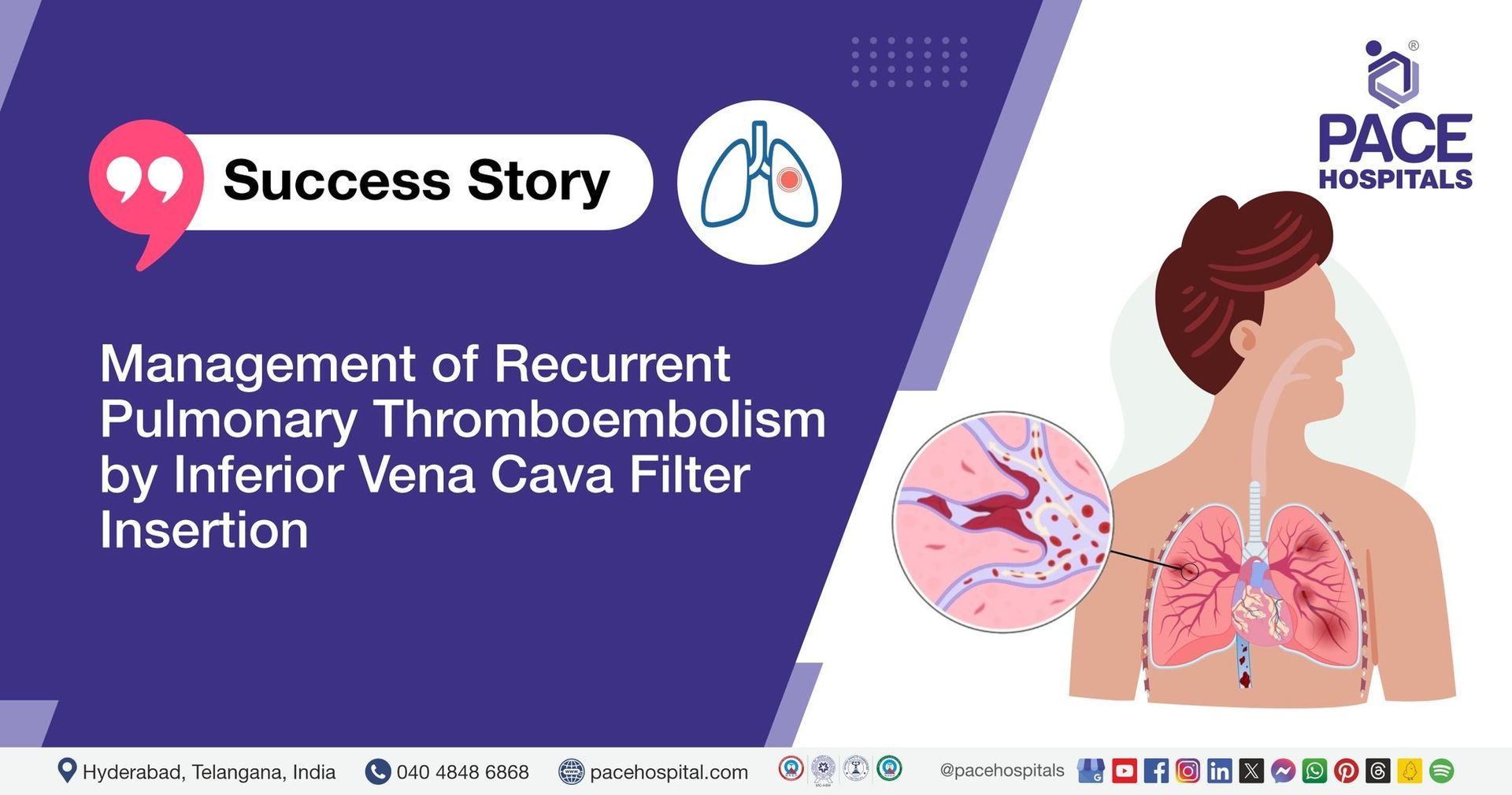Management of Recurrent Pulmonary Thromboembolism by Inferior Vena Cava Filter Insertion | Case study
PACE Hospitals
The pulmonology experts’ team from PACE Hospitals successfully performed Inferior vena cava filter insertion in a 37-year-old adult female patient with recurrent pulmonary thromboembolism (PTE).
A 37-year-old female patient was referred to the
pulmonology department of PACE Hospitals, Hyderabad, with chief complaints of shortness of breath on exertion for the last month and loss of appetite, due to which she lost about 6kg in a month.
Past medical history
The patient was not a known case of
hypertension,
diabetes mellitus or thyroid disorders. Rather she was a known case of pulmonary
thromboembolism and
deep vein thrombosis in the right lower limb followed by left lower limb. She had
gestational diabetes mellitus
during her first pregnancy which resolved after delivery.
Present medical illness
The patient was not associated with wheezing, cough, chest pain or joint pain. She was a known case of recurrent pulmonary thromboembolism and deep vein thromboembolism. She was treated for the present illness in a different hospital, where she developed an allergic reaction to an injection of cephalosporin class. Eventually she visited PACE Hospitals, Hyderabad, for further management and treatment of her recurrent pulmonary thromboembolism.
Diagnosis
Upon evaluating her past and present medical illness, she underwent a contrast enhanced computer tomography (CECT) chest, which showed fibroatelectatic foci prominently in bilateral posterior basal segments with a thick wall cavity in the left posterior basal segment and thrombosis of the right apical segmental artery. CECT abdomen revealed diffused fatty infiltrations. Considering the above findings, it is diagnosed as recurrent pulmonary thromboembolism with chronic bilateral lower limb deep vein thrombosis.
Venous thromboembolism (VTE) is the phenomenon of blood clotting in a vein. Venous thromboembolism includes deep vein thrombosis (DVT) and pulmonary embolism (PE). A pulmonary embolism (PE) is a blockage caused by preventing blood clots from travelling to the lungs that travels from another part of the body through the bloodstream. Deep vein thrombosis is caused when a blood clot is formed in deep veins, usually in the lower leg, thigh, or pelvis. Pulmonary thromboembolism is characterized by shortness of breath just like in this patient.
Treatment
The consultant interventional pulmonologist, Dr. Pradeep Kiran Panchadi, along with consultant general physician and diabetologist, asserted that insertion of inferior vena cava filter should help the patient by not allowing blood clots travelling to lungs.
The procedure was explained to the patient and all required consent clearances were obtained. Before insertion of the inferior vena cava filter, the doctors performed fiber optic bronchoscopy under strict aseptic conditions and under local anaesthesia. The bronchoscopy showed normal airways without any complications. The inferior vena cava filter was inserted through the internal jugular vein under general anaesthesia.
Aftermath
The inferior vena cava filter was successfully inserted to the patient. The procedure was uneventful, with no postoperative complications. During her hospital stay, she was treated with low molecular weight heparins, nebulization, and other supportive treatment. She was instructed to get prothrombin time, INR, and APTT tests done before hospital discharge.
Discharge notes
The patient was given LMW heparin, nebulization medications, and medicines to manage pain. She was advised not to travel long distances that restrict leg movements and report to PACE Hospitals immediately in case of sudden onset of chest pain or shortness of breath.
The patient was instructed to consult Dr. Pradeep Kiran and Dr. Dayanka Dukkipati for a review after 5 days and got discharged in a hemodynamically stable state.
Role of anticoagulants in treating recurrent pulmonary thromboembolism
It is recommended to use anticoagulants for at least 3 months in most patients with deep vein thrombosis (DVT) and/or recurrent pulmonary thromboembolism (PTE) as they play a key role in the treatment of venous thromboembolism. The main objectives of anticoagulant therapy include preventing fatal pulmonary embolism, minimizing the risk of recurrence, and reducing the likelihood of long-term complications like post-thrombotic syndrome, chronic exertional dyspnea, and chronic thromboembolic pulmonary hypertension.
After a 3-month course of anticoagulant therapy, the decision to continue treatment is typically based on evaluating the risk of recurrence if treatment is stopped, or whether the treatment is continued against the risk of bleeding. However, assessing these risks can be complex and needs periodic reevaluation to determine the benefits of extending anticoagulation treatment.
Share on
Request an appointment
Fill in the appointment form or call us instantly to book a confirmed appointment with our super specialist at 04048486868
Appointment request - health articles
Recent Articles











